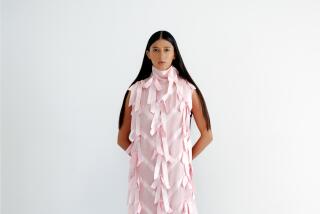Hats Off to the Berets : They’re Chic and Cheap and Showing Up Just About Everywhere
- Share via
The beret, the hat-hater’s hat, is the fashion love of the season.
It has been seen on some of the most famous heads around--Kim Basinger, Christie Brinkley, Janet Jackson, Madonna, Demi Moore and Princess Caroline of Monaco--and was a personal favorite of fashion retailers and editors during Seventh Avenue’s recent spring previews.
“Hats have been out since the 1960s. They sort of disappeared,” says Valerie Steele, a professor at the Fashion Institute of Technology in New York.
“Now that they’ve come back, they tend to be simpler, stripped-down masculine styles like baseball caps and fedoras, rather than frilly ‘30s-inspired hats with gewgaws. Berets are a nice, sporty, slightly androgynous look.”
And as fashions go, they’re cheap. The basic beret can be had for less than $15. They’re also versatile.
“A beret is the greatest prop in the world,” says Reginald Borgia, president of Kangol Headwear Inc., a British firm based in New York. “You can be rakish, somber, sinister, foolish. It’s a way of displaying your personality and how you want to look.”
“We’re selling several hundred berets per week, from basic to novelty styles,” says Eugenia Ulasewicz, president of Galeries Lafayette in New York. “We expect this is a trend that will continue, and for spring we’ll sell them in cotton and crocheted fabrics.”
Bernard Grossman, president of Betmar Hats, a New York wholesaler, estimates total U.S. sales for 1992 at 1 million, including a quarter-million his company has imported and sold.
The soft, pie-shaped cap of ancient Greek or Roman origin is as perfect for today’s long, lean fashions as it was in the 1930s, ‘50s and, most recently, the ‘70s.
There are men’s berets and women’s berets and one to suit every face. The traditional women’s beret is full enough to pull down over one ear in a mushroom shape or to pull over both ears to ward off the cold.
The men’s beret is barely big enough to get a good grip on the head. Although the bigger one is an ideal cover-up on a bad-hair day and comes in a rainbow of colors, the smaller one seems to be the style of choice, preferably in black or navy.
Your beret will serve you well. It requires no special storage and packs flat.
“It’s so easy and effortless, as basic and classic as you can get,” says David Cohen, president of David Inc., milliners. “You can dress it down with sporty sunglasses for shopping in the supermarket or stick on an ornamental gold pin when heading out to the opera.”
Of course, there are variations. Whittall & Shon, New York milliners, are known for slouchy berets embellished with bows, sequins, beads, feathers, even ‘70s-style “Love” appliques. There are also patchwork plaids and faux fur animal prints. For spring, expect crocheted berets with rayon cord braids or antique silk flowers; some will be quilted with pearls.
Kangol Headwear, which supplied berets to British armed forces during World War II, most notably Field Marshal Montgomery and his troops, sells about 70,000 berets a year in the United States.
It offers three styles. “Monty,” a smaller, spin-off of the military beret, has leather piping around the band and an embroidered emblem. “Modelaine” is the larger women’s fashion beret without a band. And there’s the traditional Basque beret, often worn with the leather band showing. They are about $10 to $20 in stores as diverse as the Gap, Marshall Fields and Patricia Field, a funky New York boutique where the military style ranks high.
“Both men and women are buying them, and we’re already on our second reorder,” says Patrick Chaitoo, assistant buyer at Patricia Field. In addition to an assortment by Kangol, there’s one by Foravi in forest green wool with bull’s-eye emblem, $26.
Magazine editor Elizabeth Saltzman, owner of more than 40 berets, favors Kangol and other leather-banded military berets that she plucks from the Army-Navy store.
“I like pulling it to the side over my eyebrow. It gives me a good arch in one eye, and other eye is hidden. Very mysterious. Very French.”






